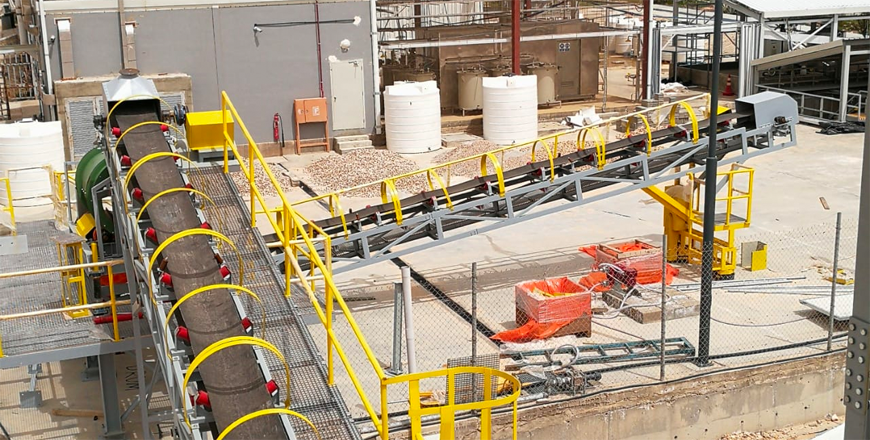
-Jordan’s uranium reserves hold around 42,000 tonnes of uranium oxide
-Official expects accelerated operations following agreement with Kazakhstan
-Over 150 Jordanian professionals trained in uranium exploration, extraction, environmental impact
AMMAN — Jordan, home to uranium reserves valued at $6.3 billion, is advancing plans to transform its vast mineral wealth into a cornerstone of energy security and economic growth. With commercial-scale uranium production on the horizon, the Kingdom aims to reduce reliance on imported energy, create high-value industries, and position itself as a regional leader in the global nuclear energy market.
A newly signed Memorandum of Understanding (MoU) with Kazakhstan, a global leader in uranium production, accelerates this vision by facilitating the transfer of cutting-edge mining technologies and expertise.
In an interview with The Jordan Times, Mohammad Shannag, General Manager of the Jordanian Uranium Mining Company (JUMCO), the investment arm of the Jordan Atomic Energy Commission (JAEC), highlighted Kazakhstan’s pivotal role in transferring advanced uranium mining technologies to Jordan.
The partnership with Kazakhstan underscores Jordan’s commitment to leveraging international cooperation while prioritising domestic capacity-building, sustainable practices, and technological self-reliance, he said.
“Kazakhstan’s Kazatomprom, the world’s largest uranium producer, will share expertise in exploration, extraction, and sustainable practices,” he said, adding that the partnership aims to optimise Jordan’s operations through cost-effective production and minimised environmental impact.
Jordan’s Uranium Potential
Jordan’s uranium reserves, concentrated in central Jordan’s carbonaceous rocks and phosphatic deposits, hold around 42,000 tonnes of uranium oxide at an average grade of 150 parts per million (ppm). “While lower than global averages, the shallow depth of these ores reduces excavation costs significantly,” Shannag explained.
He also noted that uranium-bearing phosphatic rocks in areas like Al Hasa, Al Qatrana, Al Shidya, Al Risha, and Al Ruwaished hold an estimated 200,000 tonnes of uranium oxide, with significant unexplored potential. “These deposits, combined with our ongoing exploration efforts, position Jordan as a future uranium supplier."
With current uranium prices at $150 per kilogramme, Jordan’s reserves are valued at $6.3 billion, a figure Shannag predicts could double amid rising global demand. “Dozens of new nuclear reactors worldwide and depleting reserves elsewhere are driving this surge,” he noted. "Experts predict uranium prices could exceed $300 per kilogramme in the coming years, further enhancing the economic potential of Jordan’s uranium sector."
Shannag also stressed Jordan’s commitment to producing yellowcake domestically rather than exporting raw ore. “This aligns with our national strategy to create high-value industries and jobs,” he said, adding that JUMCO has already operationalised a pilot plant in Swaqa, which processed tens of tonnes of ore in 2021, producing several kilogrammes of yellowcake.
"The company is now testing heap leaching technology to process hundreds of tonnes of carbonaceous uranium ores, aiming to produce over 100 kilogrammes of yellowcake per heap leaching operation. These trials will provide essential data for scaling up to commercial production.”
Financing and return on investment
JUMCO is preparing a bankable feasibility study to determine the expected return on investment and secure funding for commercial-scale mining. “This study will guide our strategic decisions and help us secure the necessary financing,” Shannag said.
Potential funding sources include local and international loans, financial support from global institutions like the World Bank, and private sector investments from mining companies. “The sharp rise in global uranium prices has attracted interest from regional and international companies, making Jordan’s uranium sector a promising investment opportunity,” he added.
Water scarcity
Addressing Jordan’s water scarcity, Shannag detailed plans to use treated brackish groundwater for mining. “This water is unsuitable for human consumption, but with proper treatment, it can be used in our operations.Industrial water recycling technologies will also be implemented to maximise efficiency and reduce overall water consumption.”
He also emphasised adherence to International Atomic Energy Agency (IAEA) standards. “Heap leaching residues will be treated and stored securely, away from groundwater and surface water sources. Strict environmental monitoring will include regular radiation checks for air, soil, and water to prevent contamination."
Shannag also linked uranium mining to Jordan’s nuclear energy strategy. “Local uranium will fuel future reactors, cutting import reliance and operational costs.” He also highlighted export ambitions, citing growing demand in Asia and Europe. “Countries like China, India, Turkey, Poland, and Slovakia are expanding their nuclear capacity, creating significant export opportunities for Jordan."
He explained that Jordan’s strategic location in the Middle East offers logistical advantages for exporting uranium via seaports or land routes. “Compliance with international safety and quality standards, facilitated by partnerships with organisations like the IAEA, will be crucial for accessing international markets,” Shannag added.
Investing in Jordan’s workforce
JUMCO has trained over 150 professionals in uranium exploration, extraction, environmental studies, and data evaluation. “We are actively developing local expertise to minimise reliance on foreign professionals.” Training programmes include hands-on fieldwork at mining sites and partnerships with international institutions like the IAEA and specialised mining training organisations.
“These initiatives aim to equip Jordanian youth with the skills needed to manage our uranium resources efficiently and sustainably,” he said. By fostering local talent, Jordan aims to strengthen its capacity to achieve its nuclear energy ambitions independently."
A visionary step towards energy sovereignty
Jordan’s uranium venture marks a pivotal step toward energy sovereignty and economic resilience. By leveraging cutting-edge technologies, sustainable practices, and a skilled local workforce, Jordan is poised to transform its uranium reserves into a cornerstone of its clean energy future.
As global demand for nuclear fuel surges, the kingdom’s commitment to innovation and environmental responsibility positions it not only as a regional leader but as a responsible contributor to the world’s clean energy transition. With meticulous planning and international partnerships, Jordan’s uranium ambitions could redefine its geopolitical and economic landscape for decades to come.